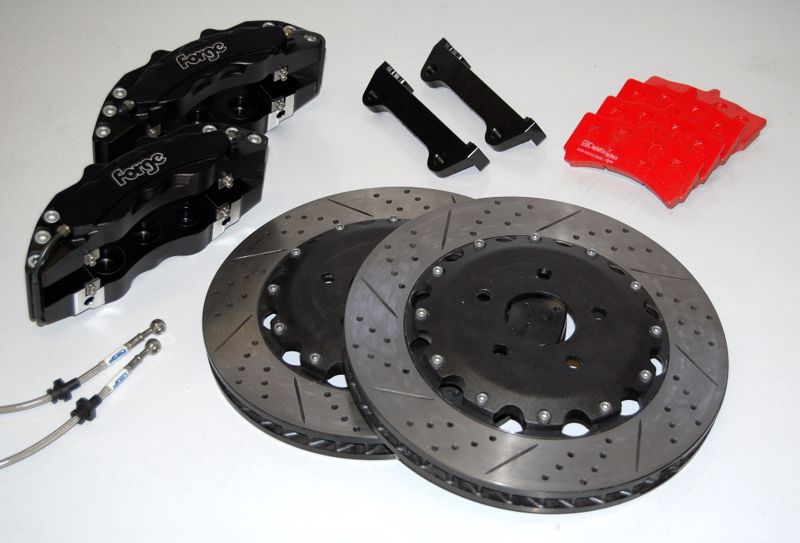

Auto parts manufacturers typically invest millions into the development and production of high-quality parts so that their customers can make confident purchases. In the vast majority cases, these offerings are made with both safety and performance in mind, as a means of better serving drivers and building a brand of reliability and quality.
However, counterfeit parts undermine those efforts, putting companies' reputations and, more importantly, drivers' lives at risk - all for the sake of making a quick buck. This is an ever-growing problem in the auto parts sector, but it's also one the entire industry recognizes. That has spurred more efforts to combat counterfeiting, with the twin goal of stamping out this nefarious threat and giving drivers products they can be confident in.
One of the big areas of improvement driven by the need to reduce parts manufacturing fraud is authentication programs that are difficult or impossible to fake, according to The Brake Report. Projects like Authentic Vision securely tag every part or product manufactured by partner companies so that they can be quickly and easily authenticated at the point of purchase, giving suppliers and end users alike significantly more confidence that they're buying the real-deal part they intended. That may be especially important because, just as counterfeiters are good at cutting corners and getting inferior parts to market, they're also seemingly improving their efforts to more closely replicate look and feel of their bogus offerings.
In addition to giving customers confidence that their purchase is genuine, these kinds of tracking programs can also make them more generally engaged with manufacturers' brands and, thus, more likely to continue relying on the high-quality offerings and tracking initiatives those companies bring to market, the report said.

What's the impact?
Authentic Vision estimates that auto parts counterfeiting is an industry that generates some $2.2 billion in revenues around the world each year, and it continues to become more widespread despite significant effort to shut down these issues. Unfortunately, this issue is increasingly prevalent when it comes to brakes in particular, more so than any other phony parts hitting the market and, potentially store shelves.
More importantly, any companies that are not using cutting-edge methods to authenticate their offerings may find themselves at considerably greater risk for becoming targeted and ultimately undermined by these fraudulent offerings, the organization warned. At this point, bogus companies are so effective at reproducing the look and feel of legitimate products that even a trained eye cannot always tell the difference, and without an authentication program that helps them avoid making a mistaken purchase in person, they could unwittingly put their customers in a bad situation.
"The best anti-counterfeiting solutions incorporate real-time authentication and tracking tied to backend systems that can positively authenticate products as genuine," says Martin Steib, vice president of marketing at Authentic Vision.
Given the value of the counterfeit parts industry worldwide, it only makes sense for legitimate manufacturers to likewise invest in more effective solutions including encryption and machine learning, Steib added. By doing so, companies can effectively stop fraud dead in its tracks because counterfeiters cannot reproduce the authentication data.
What's at stake?
Of course, it's not just manufacturers, drivers and retailers who are put at risk by counterfeit parts: Vehicle repair shops are another type of entity whose reputations and safety may be on the line, according to Auto Body News. If they unknowingly by and install phony brake products and other components, there may be liability issues involved that also arise in the event of a serious accident.
Part of the problem for all stakeholders mentioned - including regulators - is that while experts are aware this is a widespread problem, even those with the best possible data find it hard to pin down exactly what percentage of auto parts manufactured worldwide are fakes, the report said. John Lancaster of Subaru of America told the site that collaboration between manufacturers, partners, law enforcement and more is on the rise. Further, the Automotive Anti-Counterfeiting Council is working toward making more effective solutions broadly available, and increasing punishments when offenders are caught.
What's the risk?
Again, one of the biggest problems cited by experts in the fight against fraudulent brake products and other components is that even experts can't always tell the difference between the genuine article and a fake, according to Go Mechanic. That is, it's hard to tell the difference until the bogus offering breaks down, potentially in dangerous situations.
It's generally agreed that a number of risks arise from fake parts, and where brakes in particular are concerned, perhaps the most obvious is that the components stop working while a vehicle is in motion, the report said. Phony brakes tend to wear out more quickly than real ones, and do so unevenly, dramatically affecting vehicle performance and increasing the likelihood of failure and, ultimately, an accident.
For these reasons and more, authentication is critical and parts manufacturers would be wise to pursue all avenues to use the latest and greatest technology. That added peace of mind for drivers, part verification efforts can go a long way toward bolstering their reputations and, by extension, their bottom lines.
Greening Testing Laboratories is a fully certified brake testing lab that provides a variety of brake testing services worldwide. Contact Greening Associates for a complimentary consultation.